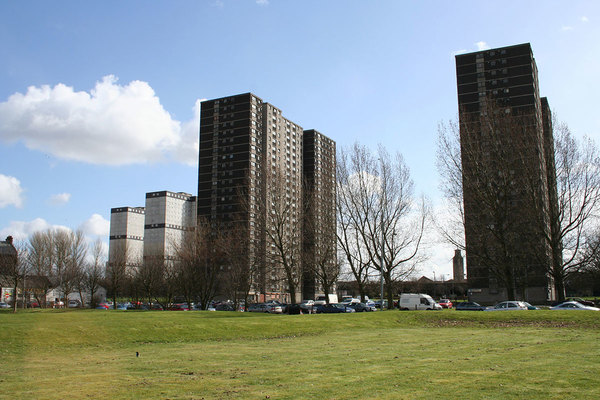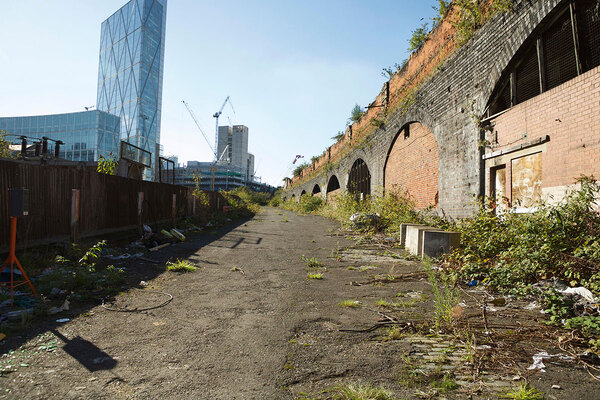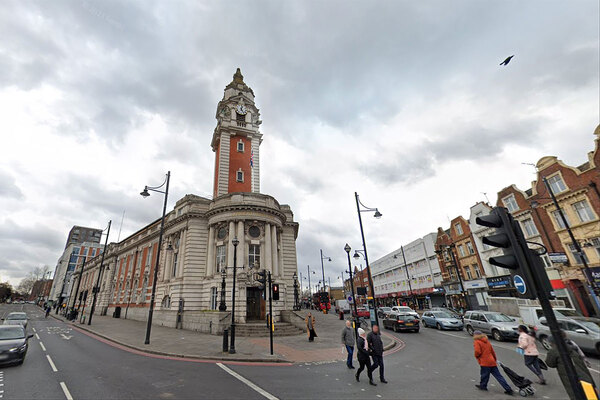You are viewing 1 of your 1 free articles
Still locked out? Serco and the Glasgow asylum seekers
As the furore continues over Serco’s eviction of Glasgow-based asylum seekers, further allegations about poor management of the refugees’ housing have emerged. Michael Lloyd reports. Illustration by John Holcroft
With many of them traumatised and vulnerable, asylum seekers in the UK face an uncertain future. In Glasgow, their plight came to light in August last year, when the company that manages their housing for the Home Office, Serco, said that those whose appeal rights for asylum are exhausted (ARE) would be evicted from their homes. If they were not in at the time of eviction, their locks would be changed.
A storm of protest followed, from politicians, housing and human rights campaigners, and refugee support organisations. Veteran human rights lawyer Mike Dailly of Govan Law Centre brought a court case to clarify the law and, in the meantime, Serco – which said it welcomed the court action – halted the evictions.
In April, Scotland’s highest court – the Court of Session – ruled that Serco’s actions were not unlawful. Evictions resumed, throwing the asylum seekers’ lives back into chaos. Challenges have since been launched, including one by local justice campaigners the Legal Services Agency, which has stayed eviction in the cases of five asylum seekers, pending a full hearing in August.
Matters are still moving fast. Just this week the Govan Law Centre won the right to appeal the Court of Session’s findings, while a group of charities launched a campaign urging the Home Office to step in and stop the evictions.
The row is an ongoing concern for the housing association sector in Glasgow, which owns around a third of the properties leased to Serco. The Scottish Federation of Housing Associations (SFHA) has called for a “pathway” approach so that the system is better prepared to deal with asylum seekers who face eviction.
Zhan McIntyre, policy lead at the SFHA, says that the set-up is unsatisfactory at the moment, and needs “a clearly defined process and support in place allowing next steps to be planned well in advance of any Home Office decision”.
Jim Strang, president of the Chartered Institute of Housing, is also chief executive of Parkhead Housing Association in the city. He is calling on the social housing sector to treat the asylum seekers with humanity. His own organisation has only one property leased to Serco but he encourages other associations to lead by example.
“We will never ever, ever put people out on the street – it is just not what we are about and I urge the rest of the sector to stand full-square behind these people,” Mr Strang insists.
Housing association NG Homes, which has offices in Springburn and Possilpark in the north of Glasgow, is a substantial provider. It owns 5,383 properties and leases 93 of them to Serco. It supports the opposition to summary lock-change evictions, at least until the legal issues are settled.
The association says it wants to help the refugees. “To date, none of our properties have been affected. However, we will continue to work with Serco to see how we can best support the refugees if this happens within our area, while always being mindful of our charitable status,” a spokesperson explains.
But it is not only the evictions policy that is causing concern. The standards of Serco’s accommodation and housing management style have been criticised, even by those whose rights are not yet exhausted.
“Serco staff are coming in to look for refugees’ paperwork. Sometimes they have just turned keys and walked in without notice”
Robina Qureshi, director, Positive Action in Housing
About 5,000 asylum seekers are housed in around 1,900 Serco-managed properties across Glasgow, and around 300 are in the ‘ARE’ category, and are therefore vulnerable to eviction.
Recent research by the Women Asylum Seeker Housing Project (W-ASH) has raised questions over the firm’s management of these homes. W-ASH describes itself as “an independent project that helps asylum seekers report housing issues to Serco”.
In the report, it says the retention of keys by Serco staff is “unacceptable and completely out of keeping with the human rights standards expected in Scotland today”.
More than nine out of 10 asylum seekers who W-ASH interviewed claim that housing officers entered their homes when they were out. Some said they had returned to find officers rifling through their papers.
Serco insists that all its employees knock before entering and come in only if the residents are out.
But, if true, these accounts describe housing management standards that fall below what is expected from a registered provider or council housing department. For instance, David Bookbinder, director of the Glasgow and West of Scotland Forum of Housing Associations, told the researchers that “housing associations never make entry to someone’s home without full consent unless there is reason to believe some imminent danger exists”.
Serco denies the allegations in the W-ASH report, which it says it was not shown before publication.
Shafiq Mohammed, a caseworker for W-ASH, is a former employee of both Serco and Orchard & Shipman, which ran services for Serco between 2012 and 2016.
He has seen many changes in 20 years of helping asylum seekers, especially since the handover of refugee housing management to private contractors. Previously, Glasgow City Council and then housing charity Ypeople ran them in the public sector for a decade.
Mr Mohammed says the accommodation available to asylum seekers “is best described as bargain basement that nobody else wants”.
He adds: “It is beside other properties that are boarded up, in closes stinking of urine, often with drug paraphernalia lying around.”
Seventy-two per cent of asylum seekers are concentrated in the city’s most deprived areas where there are high levels of poverty and higher substance abuse levels, Mr Mohammed explains. He says that anti-social behaviour and racism make these homes “just not suitable for really vulnerable people”.
“We will never ever, ever put people out on the street – it is just not what we are about”
Jim Strang, chief executive, Parkhead Housing Association
He is critical of the level of training received by Serco officers, saying it is below that of mainstream social housing workers, especially when dealing with vulnerable people.
“In just seven hours, they did not go into the depth that you need to support vulnerable people,” he recalls. Serco denies this and says that all employees “receive appropriate training”.
Anna Pearce, Mr Mohammed’s fellow caseworker at W-ASH, is equally critical. “Often, people get treated really badly,” she says. “I am working with people threatened with eviction who are getting harassing letters, harassing visits.”
Jenni Halliday, contract operations director at Serco, says: “We do not accept the findings of this survey and unfortunately, we were not given the opportunity to see the survey before publication.
“However, I am confident that our housing officers and our contractors, who are cleared with Disclosure Scotland and all carry ID badges, treat the people that we are accommodating with respect and act with their best interests in mind at all times.
Afghan refugees Rahman Sahah (middle left) and Mirwais Ahmadzai (middle right) as they start their hunger strike outside the Home Office in Glasgow. Both men had been refused asylum and were facing possible eviction by Serco (picture: Getty)
“We always give the necessary advance warning of a forthcoming visit and knock before entering our properties; if there is no response our staff will of course use their keys to enter and undertake the necessary work, in line with our contractual obligations to the Home Office.”
Ms Halliday also rejects suggestions that staff are not appropriately trained, and claims that the company has not received any complaints about rudeness. Unannounced visits are not made, she says.
However, Positive Action in Housing, another charity working with Glasgow’s asylum seekers, echoes the W-ASH report. Director Robina Qureshi says she has heard other distressing reports from asylum seekers.
“We hear about people’s wardrobes being rifled through,” she claims. “Serco staff are coming in to look for refugees’ paperwork. Sometimes they have just turned keys and walked in without notice. One refugee surprised a Serco officer looking through her papers and was told, ‘I’m just checking on your legal status.’”
Again, Serco categorically denies the allegations.
Any breaches of privacy can have serious psychological effects on people who have been traumatised by the circumstances they have escaped from.
Karzan Khwarahm, a 40-year-old asylum seeker from Iraq, lost his father and his brother to ISIS. The family clothes shop was destroyed and he fled to the UK, giving US$6,000 to people traffickers.
He was dumped in a car park near Dover and had to search for the nearest police station to claim asylum. Eventually he ended up in Serco accommodation in Glasgow, while his asylum appeals were heard and refused. He is now making a fresh claim.
Mr Khwarahm says one of the worst aspects of asylum housing is that sharing is forced on you and you have no choice where you live.
“I just want a normal life,” he tells Inside Housing. “You know, somewhere of my own to live, a job.”
“I just want a normal life – you know, somewhere of my own to live, a job”
Karzan Khwarahm, asylum seeker
Another asylum seeker, Corina*, says that she is more concerned about the asylum system than Serco officers’ behaviour.
She came to the UK as a student, but failed to get sponsorship and had to work to live. She married in the UK but her husband left her and, in 2015, she was forced to apply for asylum but was turned down.
She says that Serco has told her to leave her flat. However, this could be dangerous, as she has type one diabetes and needs somewhere to store her insulin. “I am still in the process of appealing my case,” she explains. “It is just a constant writing… telling them if they take my house away I will be homeless.”
She feels that she is caught up in an intensely bureaucratic system. She is not critical of Serco employees, however. “The two housing officers allocated to me – I was able communicate with them and express my views.”
With court action ongoing, many of those affected have to sit and wait. The Scottish government has stated its opposition to the eviction policy but it is unclear what powers it has.
Although the Glasgow-based housing associations that lease asylum seeker accommodation to Serco are expressing concern, there is no evidence yet of direct action.
Mr Bookbinder believes that the scope for direct intervention is limited. “A year ago, some of our members responded by saying Serco could not change locks without permission,” he explains. “But that was really a gesture. I am not sure we could win in court on that.”
Mr Bookbinder says that his members are concerned nonetheless. He says if evidence is found that Serco is clearly breaking the terms of leases, legal action could be possible. However, the legal avenues being explored by third parties are also valuable.
“If members are anxious, for the moment they are best to await the outcome of the challenges to the policy from legal experts, who are well qualified,” he explains.
Ms McIntyre says: “The Court of Session decision has been disappointing for asylum seekers across Glasgow who have been threatened with lock-change evictions.”
However, she is “confident housing associations will once again act with integrity and compassion”.
Meanwhile, refugees like Mr Khwarahm remain in limbo. “I sometimes don’t feel human,” he says. “I’m not allowed to work, to travel or just to live normally.”
* Name has been changed














